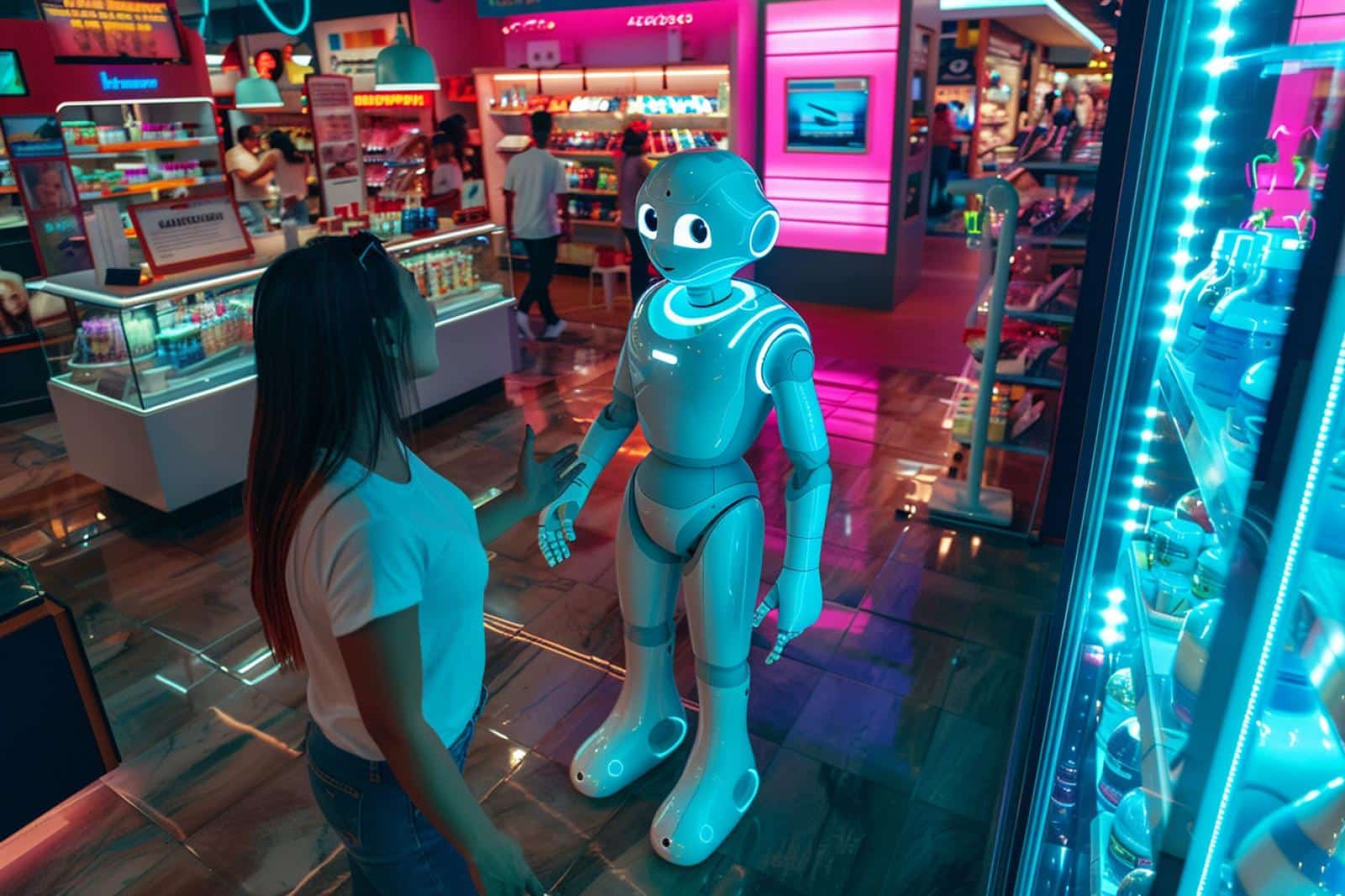In the digitally-driven age of the 21st century, the retail industry is undeniably experiencing a profound transformation. From online shopping experiences to in-store personalization, customer expectations are continually evolving. Amidst this change, one emerging technology is making significant strides in reshaping the retail landscape: Artificial Intelligence. But how exactly is AI shaping the in-store shopping experience? Let’s delve into the facets of AI in retail personalization.
AI and Customer Data: The Foundation of Personalized Shopping
As retailers, your understanding of customers plays a pivotal role in creating personalized shopping experiences. The first step towards achieving this is collecting and analyzing customer data. AI technologies can gather a wealth of data from various sources, including in-store behaviors, online interactions, and transaction histories, providing valuable insights into customer preferences and behaviors.
Also to read : How Can Small Businesses Implement Sustainable Practices Effectively?
AI-powered algorithms can analyze this data to detect patterns, preferences, and potential opportunities for personalization. For example, if the data shows that a customer regularly buys vegan products, the retailer can use this information to offer personalized discounts on vegan-friendly items during their next store visit.
AI-Driven Marketing: An Engaging In-Store Experience
Once you have a deep understanding of your customers’ preferences, the next step is to use this knowledge to engage them effectively. This is where AI comes into play in marketing.
In the same genre : How Can Integrating Virtual Reality into Staff Training Enhance Employee Skills and Productivity?
AI can create personalized marketing content that resonates with each customer’s unique preferences. It can analyze data to determine what content would be most appealing to each customer, taking into account factors like past purchases, browsing history, and demographic information.
Furthermore, AI can help businesses to optimize their marketing strategies by predicting how customers will respond to different types of content. This allows businesses to tailor their marketing campaigns more effectively, ensuring that they are delivering the right message to the right customer at the right time.
AI and Personalized In-Store Experiences
While personalized marketing can help attract customers to your store, AI can also enhance the in-store shopping experience itself. With the help of AI, you can make your store more than just a place to buy products; you can make it an experience that customers look forward to.
In-store AI can help to create personalized shopping experiences in various ways. For example, AI-powered digital signage can tailor promotional messages to individual customers based on their shopping habits. Similarly, AI can also recommend products to customers in real-time based on their in-store behaviors.
Additionally, AI can help to improve customer service. AI-powered chatbots can assist customers in finding products, answering questions, and even processing payments, providing a smoother, more personalized shopping experience.
AI, Retail Operations, and Personalization
AI also plays a crucial role in improving retail operations, thereby enhancing the personalized shopping experience. It can help retailers to manage inventory more effectively by predicting demand for different products based on customer data. This ensures that popular items are always in stock, thereby improving customer satisfaction.
Furthermore, AI can also help with pricing strategies. It can analyze customer data along with other factors such as market trends and competition to determine the optimal price for each product. This not only boosts profits but also ensures that prices are in line with customer expectations, thereby enhancing the personalized shopping experience.
How AI is Shaping the Future of Personalized Shopping
As we move into the future, the role of AI in personalizing in-store shopping is only set to increase. With advancements in technologies such as facial recognition and augmented reality, the possibilities for AI in retail are truly limitless.
For instance, facial recognition technology can be used to identify customers as they enter the store, allowing for even more personalized experiences. Similarly, augmented reality can be used to provide customers with virtual try-on experiences, making shopping more enjoyable and convenient.
Moreover, as AI algorithms become more sophisticated, they will be able to provide even more accurate and nuanced insights into customer behavior. This will allow retailers to offer even more personalized and engaging shopping experiences, thereby fostering stronger relationships with their customers.
Indeed, we are only at the beginning of the AI revolution in retail. As AI continues to evolve, it is clear that it will play an increasingly central role in shaping the retail landscape, paving the way for a future where every shopping experience is personalized to the individual customer.
The Implication of AI in Enhancing Customer Service and Engagement
To underscore the importance of artificial intelligence in retail, it’s crucial to highlight how it enhances customer service and engagement. Quality customer service is a key determinant of the overall shopping experience, and AI can drastically improve this aspect.
AI-powered virtual assistants and chatbots are at the forefront of improving customer service in the retail industry. They can assist customers in real time, providing information about products, answering queries, and even facilitating transactions. With their ability to be available 24/7, these AI tools can significantly reduce wait times and increase efficiency. This leads to an improved shopping experience, boosting customer satisfaction and overall engagement.
Moreover, AI can also monitor customer behavior to identify any problems or issues that customers may face during their shopping journey. It allows retailers to proactively address any potential issues, thereby enhancing the overall shopping experience.
Additionally, AI can also facilitate personalized product recommendations. With a deep understanding of a customer’s buying habits and preferences, AI algorithms can suggest products that the customer might like. These personalized recommendations can significantly enhance the shopping experience, making it more enjoyable and relevant for the customer.
AI and Predictive Analytics: A Game Changer in Inventory Management
Another area where AI is making a significant impact in the retail industry is inventory management. By leveraging predictive analytics, AI can help retailers manage their inventory more effectively, ensuring that popular items are always available.
AI can analyze customer data and past sales patterns to forecast demand for different products. This helps retailers to maintain optimal inventory levels, reducing the risk of overstocking or under-stocking items. It ensures that popular items are always in stock, thereby improving customer satisfaction.
With regard to pricing strategies, AI can be an invaluable tool. It can consider factors such as market trends, customer preferences, and competition to determine the optimal price for each product. This not only maximizes profits but also aligns prices with customer expectations, thus enhancing the personalized shopping experience.
Conclusion: AI – The Future of Personalized Shopping
In conclusion, artificial intelligence is undeniably changing the face of the retail industry. It is revolutionizing the way retailers collect and analyze customer data, streamline their operations, and engage with their customers. As AI technologies continue to evolve, they will undoubtedly create more opportunities for personalization in the retail industry.
From providing real-time assistance via chatbots to making personalized product recommendations, AI is redefining the shopping experience. By improving customer service and engagement, it is helping retailers to build stronger relationships with their customers.
Moreover, with its role in predictive analytics and inventory management, AI is helping retailers to operate more efficiently and effectively. It allows retailers to manage their inventory more effectively and to set optimal prices, thereby enhancing the personalized shopping experience.
The future of retail is undeniably intertwined with AI. As technology continues to advance, AI will play an increasingly central role in shaping the retail landscape. It promises a future where every shopping experience is personalized to the individual customer, making shopping more enjoyable, convenient, and engaging. As we step into this future, it is clear that the possibilities for AI in retail are truly limitless.
















